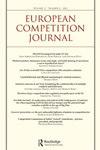如果错误风险可能包含不确定性呢?
Q2 Social Sciences
引用次数: 0
摘要
摘要为了降低假阳性错误(第一类错误),数字行业的反垄断执法部门可能忽略了假阴性错误(第二类错误)。这主要是由于对不确定性的评估,即伤害发生的可能性,以及这些市场令人难以置信的动态。本文章由计算机程序翻译,如有差异,请以英文原文为准。
What if error risk could embrace uncertainty?
ABSTRACT Aiming at lowering false positive errors (type I error), antitrust enforcement in the digital sector may have neglected false negative errors (type II error), notably due to the assessment of uncertainty, as a probability of occurrence of harm and as a consequence of the incredible dynamics of these markets.
求助全文
通过发布文献求助,成功后即可免费获取论文全文。
去求助
来源期刊

European Competition Journal
Social Sciences-Law
CiteScore
1.50
自引率
0.00%
发文量
12
期刊介绍:
The European Competition Journal publishes outstanding scholarly articles relating to European competition law and economics. Its mission is to help foster learning and debate about how European competition law and policy can continue to develop in an economically rational way. Articles published in the Journal are subject to rigorous peer review by leading experts from around Europe. Topics include: -Vertical and Conglomerate Mergers -Enlargement of the Union - the ramifications for Competition Policy -Unilateral and Coordinated Effects in Merger Control -Modernisation of European Competition law -Cartels and Leniency.
 求助内容:
求助内容: 应助结果提醒方式:
应助结果提醒方式:


